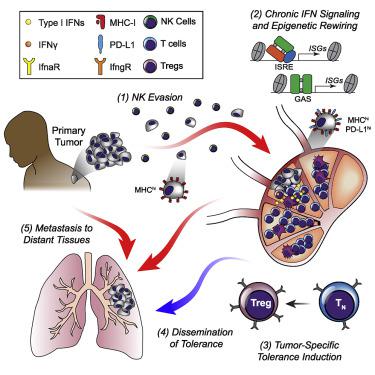Cell ( IF 64.5 ) Pub Date : 2022-05-06 , DOI: 10.1016/j.cell.2022.04.019 Nathan E Reticker-Flynn 1 , Weiruo Zhang 2 , Julia A Belk 1 , Pamela A Basto 3 , Nichole K Escalante 1 , Genay O W Pilarowski 1 , Alborz Bejnood 2 , Maria M Martins 1 , Justin A Kenkel 1 , Ian L Linde 1 , Sreya Bagchi 1 , Robert Yuan 1 , Serena Chang 4 , Matthew H Spitzer 5 , Yaron Carmi 6 , Jiahan Cheng 1 , Lorna L Tolentino 1 , Okmi Choi 1 , Nancy Wu 1 , Christina S Kong 7 , Andrew J Gentles 8 , John B Sunwoo 9 , Ansuman T Satpathy 10 , Sylvia K Plevritis 11 , Edgar G Engleman 7

|
For many solid malignancies, lymph node (LN) involvement represents a harbinger of distant metastatic disease and, therefore, an important prognostic factor. Beyond its utility as a biomarker, whether and how LN metastasis plays an active role in shaping distant metastasis remains an open question. Here, we develop a syngeneic melanoma mouse model of LN metastasis to investigate how tumors spread to LNs and whether LN colonization influences metastasis to distant tissues. We show that an epigenetically instilled tumor-intrinsic interferon response program confers enhanced LN metastatic potential by enabling the evasion of NK cells and promoting LN colonization. LN metastases resist T cell-mediated cytotoxicity, induce antigen-specific regulatory T cells, and generate tumor-specific immune tolerance that subsequently facilitates distant tumor colonization. These effects extend to human cancers and other murine cancer models, implicating a conserved systemic mechanism by which malignancies spread to distant organs.
中文翻译:

淋巴结定植诱导肿瘤免疫耐受促进远处转移
对于许多实体恶性肿瘤,淋巴结 (LN) 受累是远处转移性疾病的先兆,因此是一个重要的预后因素。除了作为生物标志物的效用外,LN 转移是否以及如何在形成远处转移中发挥积极作用仍然是一个悬而未决的问题。在这里,我们开发了 LN 转移的同系黑色素瘤小鼠模型,以研究肿瘤如何扩散到 LN 以及 LN 定植是否影响向远处组织的转移。我们表明,表观遗传学灌输的肿瘤内在干扰素反应程序通过使 NK 细胞逃避和促进 LN 定植来赋予增强的 LN 转移潜能。LN 转移抵抗 T 细胞介导的细胞毒性,诱导抗原特异性调节性 T 细胞,并产生肿瘤特异性免疫耐受,随后促进远处肿瘤定植。这些影响扩展到人类癌症和其他小鼠癌症模型,暗示恶性肿瘤扩散到远处器官的保守系统机制。


























 京公网安备 11010802027423号
京公网安备 11010802027423号